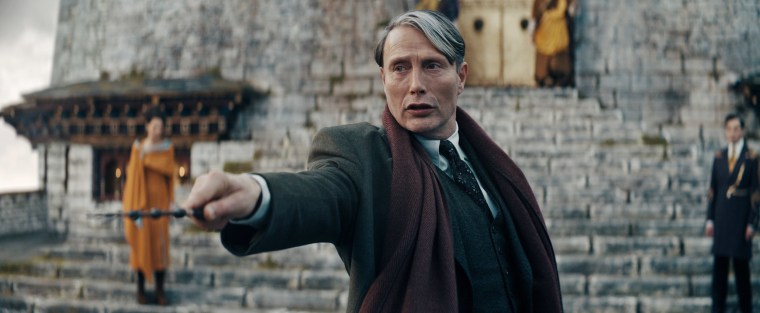For the first time since 2011’s “Harry Potter and the Deathly Hallows Part 2,” we finally have a coherent Wizarding World film devoid of overstuffed confusing subplots. But the third “Fantastic Beasts” — delayed and retooled in the wake of “The Crimes of Grindelwald’s” critical and commercial disappointments — relies far too heavily on an overly simplified, ham-fisted Donald Trump allegory. This franchise’s fanciful deck chairs are arranged appropriately for once, but it’s still sinking.
This franchise’s fanciful deck chairs are arranged appropriately for once, but it’s still sinking.
Ever since Warner Bros. Pictures signed a new deal with J.K. Rowling in 2013 to continue the Wizarding World, almost nothing has gone according to plan. Actors Johnny Depp and Ezra Miller became lightning rods of controversy, the former accused of spousal abuse (which he denies), the latter of assault and battery. Depp was eventually fired and replaced with Mads Mikkelsen. Miller has not yet been removed from the narrative, but with a headline-generating arrest only days before “The Secret of Dumbledore’s” premiere, his return seems unlikely. Meanwhile, Rowling’s anti-transgender writings have undermined her entire Potterverse idealism.
The behind-the-scenes drama was compounded by two movies that failed to live up to the previous eight “Harry Potter” films. But “Fantastic Beasts: The Secrets of Dumbledore” solves many of the problems that have plagued the franchise. (The production’s biggest fix may have been finally replacing Rowling as the main scriptwriter.)
The resulting “Secrets of Dumbledore” feels like a genuinely worthy installment in the Potter canon. The opening scene, featuring Jude Law’s Dumbledore and Mikkelsen’s Grindelwald, features two actors who feel (and look) like the characters from the original Potter franchise. The film also acknowledges their LGBTQ+ relationship out loud, breaking with Rowling’s endless circular hints of a “love which dare not speak its name.”
Also, the “Fantastic Beasts” part of the title feels finally legitimate. This is the story of a rare mystical animal (a “qilin,” which looks like a deer with golden dragon scales), whose charming relationship with the franchise’s original leading character Newt Scamander (Eddie Redmayne) is vital to the movie’s plot. There are also various other fanciful creatures relevant to the action, instead of endless exercises in creating merchandisable stuffies.
But without an overabundance of storytelling (and random creatures) to hide behind, we’re left with Rowling’s original and still underdeveloped idea of “Grindelwald as Wizarding Hitler.”
These Trumpian overtones feel deeply uncomfortable, mainly because they raise the specter of Rowling’s own move into reactionary politics.
In an attempt to make this plot more relevant, Grindelwald evolves from an accused criminal to a populist political figure attempting to steal the Wizarding World’s election. But these Trumpian overtones feel deeply uncomfortable, mainly because they raise the specter of Rowling’s own move into reactionary politics.
Once such a story might have felt like a piece of the Potterverse anti-fascist idealism. But now it feels disingenuous, like the Wizarding World is still mouthing words it no longer means. The moral authority the franchise once had among fans is gone; it’s hard to take any parable about embracing all kinds and rejecting bigotry seriously.
The film also mysteriously removed the franchise’s female lead, Tina Goldstein (Katherine Waterson), who winds up with about 90 seconds of screen time. For a franchise where the fanbase trends female, this decision is eyebrow-raising. Worse, it revises Jessica Williams’ character — who was initially Tina’s teacher and mentor, an American Dumbledore — into a fast-talking supporting role with a terrible British accent. Williams winds up feeling out of place and utterly miscast.
It also doesn’t help that the film seems increasingly desperate to bring back “the magic of Hogwarts.” Dumbledore repeats the famous “what is right versus what is easy” line from “Harry Potter and the Goblet of Fire” multiple times, and multiple scenes are set in Hogwarts’ Great Hall, where Slytherins play mean tricks. Characters literally walk into rooms and grandly declare where they are as if to say, “Remember this spot, guys? Remember how you loved it?” We even revisit the silly magical gags of “Harry Potter and the Sorcerer’s Stone,” featuring fanged monster books and bewitched items that spew baked goods.
The film is simply trying too hard.
“Harry Potter” as a franchise will endure — the Warner-owned TBS’ “Harry Potter: Hogwarts Tournament of Houses” was a ratings hit, and the 20th anniversary Potter retrospective on HBO Max was the gold standard of the art form. But nostalgia alone can’t save “Fantastic Beasts,” with reports that the newly-formed Warner Bros. Discovery will pull the plug on the final two films should this movie not perform.
The Wizarding World’s spell is officially broken.
